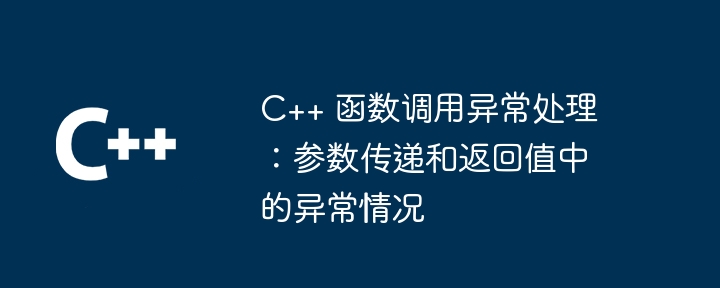
Summary: Exception handling in function calls involves: Parameter passing exception: When the passed parameters cause an exception, the exception is passed to the calling function. Return value exception: The function throws an exception through the return value, which is passed directly to the calling function. Practical example: MyClass::func() throws std::invalid_argument exception when the function parameter is an empty string, and the main() function captures and handles the exception.

C Function call exception handling: exceptions in parameter transfer and return value
In C, during function call Exceptions may involve parameter passing and return value handling. In order to handle these exceptions correctly, it is crucial to understand the mechanism behind them.
Exceptions in parameter passing
During a function call, if the passed parameter itself raises an exception, the exception will be passed to the calling function. This is because the parameter is passed as a normal object, just like other data types.
For example, consider the following function:
void func(int& x) { if (x == 0) throw std::invalid_argument("x cannot be zero"); ... }
If a value of 0 is passed when calling this function, anstd::invalid_argumentexception will be thrown. This exception will be passed to the calling function and needs to be caught and handled by the calling function.
Exceptions in return values
Functions can also throw exceptions through their return values. This is accomplished by specifying whether a function may throw an exception using thenoexceptkeyword. If a function is declarednoexcept, it is guaranteed not to throw any exceptions. Otherwise, it may throw an exception.
If a function throws an exception, it will be passed directly to the calling function. For example, consider the following function:
int func() noexcept { return 1; }
If this function throws an exception, the calling function will catch and handle the exception.
Practical Case
To illustrate how to handle exceptions in parameter passing and return values, consider the following example:
#include#include class MyClass { public: void func(const std::string& s) { if (s.empty()) throw std::invalid_argument("s cannot be empty"); } }; int main() { try { MyClass obj; obj.func(""); // 抛出 std::invalid_argument } catch (std::exception& ex) { std::cout << "Caught exception: " << ex.what() << std::endl; } return 0; }
In this example,MyClass::func()When thesparameter of the function is an empty string, anstd::invalid_argumentexception is thrown.main()The function caught and handled this exception.
Conclusion
Understanding the mechanics of function call exception handling in C is critical to writing robust code. By properly handling exceptions in parameter passing and return values, you can ensure that your application will still function normally under abnormal conditions.
The above is the detailed content of C++ function call exception handling: exceptions in parameter passing and return values. For more information, please follow other related articles on the PHP Chinese website!
 What are the differences between c++ and c language
What are the differences between c++ and c language Recommended learning order for c++ and python
Recommended learning order for c++ and python Cost-effectiveness analysis of learning python and c++
Cost-effectiveness analysis of learning python and c++ Is c language the same as c++?
Is c language the same as c++? Which is better to learn first, c language or c++?
Which is better to learn first, c language or c++? The difference and connection between c language and c++
The difference and connection between c language and c++ C++ software Chinese change tutorial
C++ software Chinese change tutorial Cost-effectiveness analysis of learning python, java and c++
Cost-effectiveness analysis of learning python, java and c++



